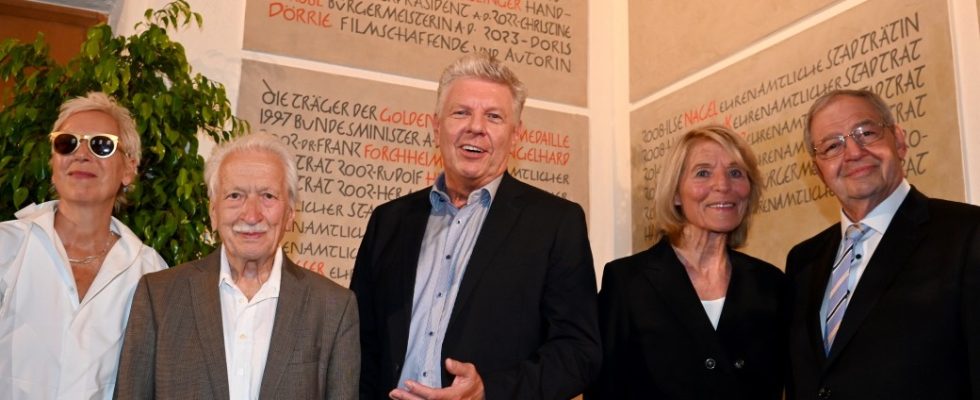What do Munich honorary citizens actually get from being honorary citizens of the city? Apart from the honor of belonging to this small circle of the chosen ones, of course? Doris Dorrie doesn’t know. The director, writer and HFF professor shrugs her shoulders as she studies the plaques with well-known names from the city’s history such as Leo von Klenze, Gabriel von Seidl and Max von Pettenkofer. They were also made honorary citizens of Munich at the time, just like Doris Dörrie, Ernst Grube, Hannelore Kiethe, Hans Podiuk and Walter Zöller. The square panels hang in the upper foyer of the old town hall. The new ones have now been immortalized in two pieces, neatly brushed on in red and black by the painter Marion Kropp.
Dörrie came early to the official ceremony on Monday evening. She sits in a corner, stubbornly refusing the bite-sized cones filled with hummus, curry cream and guacamole. The volume in the foyer is still good enough to have a conversation. As soon as the high room fills up with people, this becomes more and more difficult. She found out about the honor from the SZ, says Dörrie with a subtle smile, and as she continues to study the list of names, criticism forms in her head. Almost only male names. Munich is so much more diverse and colourful, that’s not reflected here, she says. She thinks the city could step on the gas a bit in this regard. Later in the hall, after receiving the certificate from Mayor Dieter Reiter, the director, who was born in Hanover in 1955, emphasizes her love for Munich. “It has become my city,” she says, her “Magic Minga”. Then she seizes the opportunity to warn: “We have to be careful that the city doesn’t suffocate on its wealth.”
Doris Dörrie is now one of nine women who have been awarded honorary citizenship. They are nominated by the City Council’s Council of Elders because they have done exemplary work for the city. Only nine women out of 66 award-winning Munich residents? When Reiter mentions this number in his welcome speech, he immediately notices the imbalance. After all, it is another step in the right direction, he emphasizes. In the first 175 years, only men were considered at all. The title of honorary citizen is the highest distinction that a municipality in Bavaria can bestow. This has been possible since 1818. Two years later, civil servant Georg Friedrich von Zentner became the first honorary citizen. The award has also been denied several times. In the current list of names there is a gap between 1931 and 1949.
In 1995, 28 years ago, long-time FDP politician Hildegard Hamm-Brücher (1921-2016) was the first woman to receive honorary citizenship. Most recently, the award was presented to former mayor Christine Strobl in 2022. And yet there are only two women among the five honorees this year. With Dörrie just now Hannelore Kiethe, co-founder and chairwoman of the Münchner Tafel. She jumps dynamically onto the stage in a black pantsuit. In an image film, the wholesale market hall is shown as their most important workplace. The Munich food bank now distributes a good 6.7 million kilograms of donated food to the needy every year. Almost 1,000 volunteers are now working at the 28 distribution points and 100 social stations. “I see the honorary citizenship as a distinction for all employees,” says Kiethe. “It touches me.” Away from the stage, she calls out to the congratulating municipal officer Kristina Frank. “I would be nothing without the team.” And then she tells how much she depresses the increasing poverty in Munich. When, for example, crying mothers called the Tafel’s newly established hotline because they no longer had any food for their children. The support of the population and the sponsors strengthens her and the team.
Rachel Salamander, Jutta Speidel and Christine Strobl are among the nine honored women. The name of Doris Dörrie is now on the board, inscribed by the Munich artist Marion Kropp.
(Photo: Stephan Rumpf)
Ernst Grube is touched, satisfied, but also thoughtful. “I’m very pleased with the attention I’m getting now,” says the native of Munich. “But I fought for it.” The 90-year-old has his place next to Mayor Reiter at the white-covered roll of honor, where there will later be turkey roulades or stuffed zucchini blossoms. For decades, Grube has been tirelessly telling about his experiences during the Nazi era in lectures and in school classes. He had to spend years of his childhood in a home and was finally liberated from the Theresienstadt concentration camp in 1945 with his Jewish mother and siblings. Grube says his thoughts are with his parents. With his avowed communist father, who never divorced his Jewish mother and always fought for the family. Remembering is so important mine. “I wish that our work would be noticed.”
With Hans Podiuk, 76, and Walter Zöller, 82, two long-standing CSU city councilors are among the new honorary citizens. Only Podiuk came, his party colleague is unable to attend due to a broken leg. He didn’t expect this award, says Podiuk. “I wasn’t the epitome of the Prince of Peace.” For 42 years he was almost every day in the town hall and even a candidate for mayor. For that, according to Dieter Reiter, he actually deserved the medal for bravery. The head of town hall explains at the end that honorary citizenship does not entail any rights or obligations.

